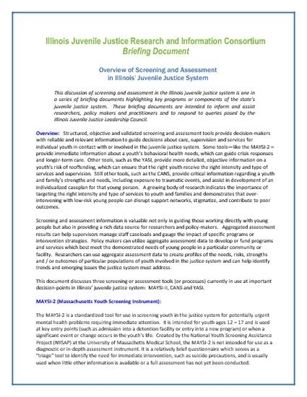Overview of Screening and Assessment in Illinois’ Juvenile Justice System
Published Dec 8, 2013, Illinois Juvenile Justice Research and Information Consortium Briefing Document
Download
(524 KB)

Structured, objective and validated screening and assessment tools provide decision-makers with reliable and relevant information to guide decisions about care, supervision and services for individual youth in contact with or involved in the juvenile justice system. Some tools—like the MAYSI-2 – provide immediate information about a youth’s behavioral health needs, which can guide crisis responses and longer-term care. Other tools, such as the YASI, provide more detailed, objective information on a youth’s risk of reoffending, which can ensure that the right youth receive the right intensity and type of services and supervision. Still other tools, such as the CANS, provide critical information regarding a youth and family’s strengths and needs, including exposure to traumatic events, and assist in development of an individualized caseplan for that young person. A growing body of research indicates the importance of targeting the right intensity and type of services to youth and families and demonstrates that over-intervening with low-risk young people can disrupt support networks, stigmatize, and contribute to poor outcomes.
Screening and assessment information is valuable not only in guiding those working directly with young people but also in providing a rich data source for researchers and policy-makers. Aggregated assessment results can help supervisors manage staff caseloads and gauge the impact of specific programs or intervention strategies. Policy makers can utilize aggregate assessment data to develop or fund programs and services which best meet the demonstrated needs of young people in a particular community or facility. Researchers can use aggregate assessment data to create profiles of the needs, risks, strengths and / or outcomes of particular populations of youth involved in the justice system and can help identify trends and emerging issues the justice system must address.
This document discusses three screening or assessment tools (or processes) currently in use at important decision-points in Illinois’ juvenile justice system: MAYSI-II, CANS and YASI.